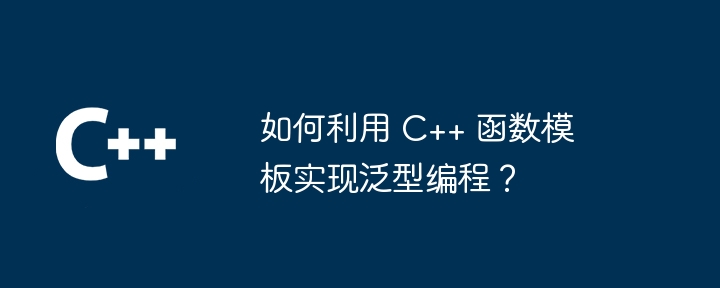How to implement generic programming using C++ function templates?
泛型编程通过函数模板实现,允许创建通用的代码处理不同类型的数据,无需修改源代码。函数模板的基本语法为:template <typename T> ReturnType FunctionName(T arg1, T arg2, ...),其中 T 为类型参数。通过实例化模板,编译器会生成指定类型的具体代码。例如,交换两个元素的函数可以泛化为:template <typename T> void Swap(T& a, T& b),允许交换不同类型的元素,如整数、浮点数或字符串。

利用 C++ 函数模板实现泛型编程
什么是泛型编程?
泛型编程是一种编程范式,可创建通用的代码,利用数据类型的抽象,而不是为特定数据类型编写具体代码。它允许代码在不修改源代码的情况下处理不同类型的数据。
函数模板
C++ 函数模板提供了一种定义通用的、类型未知的函数的方法。编译器将根据所传递的参数类型对模板实例化出具体代码。
函数模板语法
基本语法如下:
template <typename T> ReturnType FunctionName(T arg1, T arg2, ...);
其中:
template <typename T>声明一个函数模板,T是类型参数。ReturnType是函数的返回类型。FunctionName是函数的名称。arg1,arg2等是函数的参数。
实战案例:交换两个元素
假设我们有一个函数用于交换两个整数,我们希望将其泛化为可以交换任何类型的元素。我们可以使用函数模板:
template <typename T>
void Swap(T& a, T& b) {
T temp = a;
a = b;
b = temp;
}用法
现在,我们可以使用 Swap 函数交换不同类型的元素,而无需编写不同的函数:
int a = 10, b = 20; Swap(a, b); // 交换两个整数 double x = 3.14, y = 2.71; Swap(x, y); // 交换两个双精度浮点数 std::string s1 = "Hello", s2 = "World"; Swap(s1, s2); // 交换两个字符串
优点
- 重用性:函数模板可以针对不同类型的数据类型重用。
- 代码简洁:它避免了为不同类型编写重复的代码。
- 类型安全:编译器检查类型兼容性,确保在运行时不会出现类型错误。
The above is the detailed content of How to implement generic programming using C++ function templates?. For more information, please follow other related articles on the PHP Chinese website!

Hot AI Tools

Undresser.AI Undress
AI-powered app for creating realistic nude photos

AI Clothes Remover
Online AI tool for removing clothes from photos.

Undress AI Tool
Undress images for free

Clothoff.io
AI clothes remover

AI Hentai Generator
Generate AI Hentai for free.

Hot Article

Hot Tools

Notepad++7.3.1
Easy-to-use and free code editor

SublimeText3 Chinese version
Chinese version, very easy to use

Zend Studio 13.0.1
Powerful PHP integrated development environment

Dreamweaver CS6
Visual web development tools

SublimeText3 Mac version
God-level code editing software (SublimeText3)

Hot Topics
 1386
1386
 52
52
 What is the role of char in C strings
Apr 03, 2025 pm 03:15 PM
What is the role of char in C strings
Apr 03, 2025 pm 03:15 PM
In C, the char type is used in strings: 1. Store a single character; 2. Use an array to represent a string and end with a null terminator; 3. Operate through a string operation function; 4. Read or output a string from the keyboard.
 Why does an error occur when installing an extension using PECL in a Docker environment? How to solve it?
Apr 01, 2025 pm 03:06 PM
Why does an error occur when installing an extension using PECL in a Docker environment? How to solve it?
Apr 01, 2025 pm 03:06 PM
Causes and solutions for errors when using PECL to install extensions in Docker environment When using Docker environment, we often encounter some headaches...
 How to calculate c-subscript 3 subscript 5 c-subscript 3 subscript 5 algorithm tutorial
Apr 03, 2025 pm 10:33 PM
How to calculate c-subscript 3 subscript 5 c-subscript 3 subscript 5 algorithm tutorial
Apr 03, 2025 pm 10:33 PM
The calculation of C35 is essentially combinatorial mathematics, representing the number of combinations selected from 3 of 5 elements. The calculation formula is C53 = 5! / (3! * 2!), which can be directly calculated by loops to improve efficiency and avoid overflow. In addition, understanding the nature of combinations and mastering efficient calculation methods is crucial to solving many problems in the fields of probability statistics, cryptography, algorithm design, etc.
 Four ways to implement multithreading in C language
Apr 03, 2025 pm 03:00 PM
Four ways to implement multithreading in C language
Apr 03, 2025 pm 03:00 PM
Multithreading in the language can greatly improve program efficiency. There are four main ways to implement multithreading in C language: Create independent processes: Create multiple independently running processes, each process has its own memory space. Pseudo-multithreading: Create multiple execution streams in a process that share the same memory space and execute alternately. Multi-threaded library: Use multi-threaded libraries such as pthreads to create and manage threads, providing rich thread operation functions. Coroutine: A lightweight multi-threaded implementation that divides tasks into small subtasks and executes them in turn.
 distinct function usage distance function c usage tutorial
Apr 03, 2025 pm 10:27 PM
distinct function usage distance function c usage tutorial
Apr 03, 2025 pm 10:27 PM
std::unique removes adjacent duplicate elements in the container and moves them to the end, returning an iterator pointing to the first duplicate element. std::distance calculates the distance between two iterators, that is, the number of elements they point to. These two functions are useful for optimizing code and improving efficiency, but there are also some pitfalls to be paid attention to, such as: std::unique only deals with adjacent duplicate elements. std::distance is less efficient when dealing with non-random access iterators. By mastering these features and best practices, you can fully utilize the power of these two functions.
 How to apply snake nomenclature in C language?
Apr 03, 2025 pm 01:03 PM
How to apply snake nomenclature in C language?
Apr 03, 2025 pm 01:03 PM
In C language, snake nomenclature is a coding style convention, which uses underscores to connect multiple words to form variable names or function names to enhance readability. Although it won't affect compilation and operation, lengthy naming, IDE support issues, and historical baggage need to be considered.
 Usage of releasesemaphore in C
Apr 04, 2025 am 07:54 AM
Usage of releasesemaphore in C
Apr 04, 2025 am 07:54 AM
The release_semaphore function in C is used to release the obtained semaphore so that other threads or processes can access shared resources. It increases the semaphore count by 1, allowing the blocking thread to continue execution.
 Issues with Dev-C version
Apr 03, 2025 pm 07:33 PM
Issues with Dev-C version
Apr 03, 2025 pm 07:33 PM
Dev-C 4.9.9.2 Compilation Errors and Solutions When compiling programs in Windows 11 system using Dev-C 4.9.9.2, the compiler record pane may display the following error message: gcc.exe:internalerror:aborted(programcollect2)pleasesubmitafullbugreport.seeforinstructions. Although the final "compilation is successful", the actual program cannot run and an error message "original code archive cannot be compiled" pops up. This is usually because the linker collects




